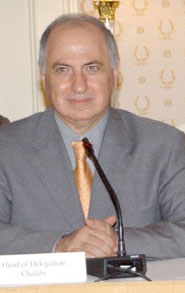 Ahmed Chalabi was a key figure in enabling and encouraging the US-led invasion of Iraq, but came to embody the poor American planning and unrealistic expectations that doomed his country to disaster.
Ahmed Chalabi was a key figure in enabling and encouraging the US-led invasion of Iraq, but came to embody the poor American planning and unrealistic expectations that doomed his country to disaster.
Chalabi, 71, died of a heart attack in Baghdad more than a decade after realising his dream of overthrowing Saddam Hussein, but not the political power he had hoped to wield after the dictator’s fall.
Washington’s reliance on information from Chalabi to justify the 2003 invasion and its misplaced belief that he and his opposition Iraqi National Council could govern post-Saddam helped drag the US into a nine-year quagmire.
Chalabi was born in October 1944 to a wealthy Baghdad family, but left the country in 1956 and spent most of his life in Britain and the United States, where he received a doctorate in mathematics.
His exile endeared him to Western officials, but meant he avoided the long years of suffering in his home country caused by war, sanctions and dictatorship, leaving him detached from the people he claimed to represent.
Chalabi founded the INC along with other figures opposed to Saddam in 1992 and organised a Kurdish uprising in northern Iraq in the mid-1990s.
But the uprising failed, hundreds of people were killed and he later fled, only returning when US-led invading forces took control.
Undaunted, he gave a steady stream of briefings that were used to bolster the case for the war.
Key figures in president George W. Bush’s administration hoped Chalabi and the INC might take over as an interim government after Saddam’s ouster.
But because of its long years abroad, his group was little known and little liked inside Iraq and American plans for a smooth and easy political transition fell apart.
– False intelligence, graft allegations –
Disastrous US moves such as disbanding the Iraqi army, an insufficient number of coalition troops to secure the country against insurgency and rising sectarian tensions instead led to years of bloodshed that continue to this day.
Chalabi was the darling of Washington in 2003, but lost favour after the invasion when information he provided regarding Saddam’s alleged possession of weapons of mass destruction and links to Al-Qaeda turned out to be false.
He was also accused of providing information to US foe Iran.
Iraqi police and US forces raided his home in 2004 and seized documents and computers. The only formal charge was putting forged banknotes into circulation after the raid turned up a small number in his home.
Chalabi was dogged by repeated allegations of corruption and was convicted by a Jordanian court of embezzling funds from the collapsed Petra bank in 1992, a case he claims was politically motivated.
Following the invasion, Chalabi held the rotating presidency of the US-appointed Iraqi Governing Council, served as deputy prime minister, temporarily held the key oil portfolio and became a member of parliament.
But he never reached the political heights to which he aspired.
Chalabi, a secular Shiite, was also one of the main proponents of the “de-Baathification” drive to remove alleged Saddam supporters from public life, which alienated Iraq’s Sunni Arab minority and fuelled the revolt against US-led forces.
Iraqi government policies in subsequent years further disenchanted Sunnis, and anger within the community ultimately laid the groundwork for the Islamic State jihadist group’s seizure of large parts of the country last year.



